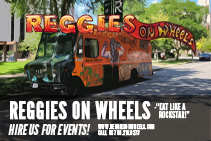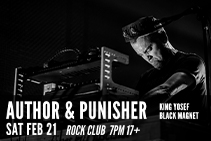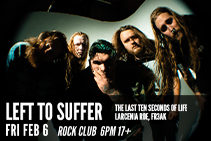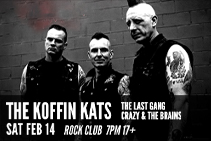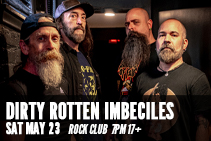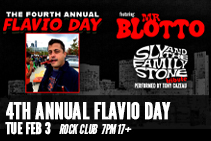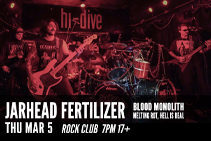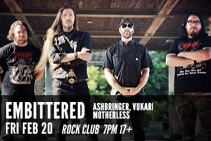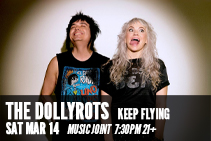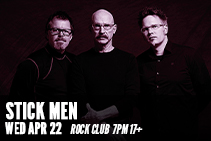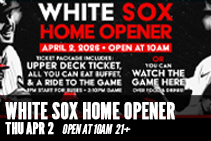
BRAID
For three or four years, Bob Nanna hadn’t heard much from his former Braid bandmate Chris Broach—not since the band’s brief reunion in 2004, at least. It wasn’t due to animosity; both were simply busy with other musical pursuits and living in separate cities. Nanna was in Chicago, a two and a half hour trek from Champaign, IL where Broach lived and where Braid had started writing its angular, dissonant songs in 1993.
When Broach moved to Chicago, though, it took no time before he and Nanna reconnected. They began bumping into each other at local shows and bars before they created new reasons to reconvene. “At the time,” Nanna tells, “I had started to do these DJ nights at a bar called Bar DeVille, and they wanted me to do a punk/indie DJ night. I thought, I wonder if Chris would want to come and join me?”
“Our night was called ‘Shield Your Eyes’, like the Jawbreaker song,” Broach adds. “We would sit there after DJing, drinking at two in the morning when the bar was closed, and just start talking about old times, realizing how good those were.”
These good times can be traced back to 1993, when Nanna left the Chicago suburbs and started attending the University of Illinois in Champaign-Urbana. Though he sang and played drums back home in a band called Friction, he hoped to meet new musicians while he was away, and had already met a drummer—Roy Ewing, whom he met after posting an ad in Maximum Rocknroll to trade video tapes of concerts he had recorded. “Within the first week or so of me being down there,” he continues, “we hung out and I met some of his friends, one of which was Todd Bell, who played bass, and we hit it off. We all loved the same bands, so we started playing music.”
Broach was added to Braid after seeing one of their early shows in Urbana, where he too would soon be attending U of I. “I ended up talking to the guys afterwards,” he remembers, “and I said, ‘Hey you guys did a really good job except, well, your one guitar player was out of tune the whole time.’” The band, who had already lost their first singer, knew that things were not working out with this guitarist, and were ready to recruit Broach. “At some point, they found out that I sang and played guitar,” Broach continues, “and Roy basically offered me a job. I went to the show and ended up leaving being introduced as the newest member of Braid.”
With Broach and Nanna as principal songwriters, Braid started writing songs that combined the sounds of DC with those of the Bay Area. “We would soak up and study pretty much anything on Dischord,” he says. “Anytime any of those bands—like Fugazi, Nation of Ulysses, Shudder to Think, or Jawbox—came anywhere near Chicago, we were there.” In addition to the music, Nanna was obsessed with the energy that these bands expressed onstage. “But Braid was also equal parts of music coming out of the Bay Area—Jawbreaker, Samiam, even Green Day at the time to some extent,” Nanna adds. “They were a little less serious, and we wanted our music to be fun, but they were maybe a little more straight-forward, more pop, and had a lot more of the storytelling aspects that I loved.”
For four years, Braid toured relentlessly and released a series of records—including full-lengths Frankie Welfare Boy Age Five and Age Of Octeen—all of which led to the release 1998′s Frame & Canvas, a record that both Nanna and Broach agree best captures Braid’s essence. Songs like “Killing a Camera,” showcased Nanna’s croon, which seemed tossed by frantic, foaming chords and a slow but stirring drumbeat; others, such as “A Dozen Roses”, captured the band’s dissonant darkness and an explosive desperation that lent itself so well to the emo scene that Braid helped build. But Frame & Canvas also expressed a focused power to which their previous releases only alluded—a power, Broach says, that was brought to the band by drummer Damon Atkison, who replaced Ewing a year earlier. “We got Damon and went from being a band that was quirky to one that was much more of a rock band,” he explains. “Roy’s drumming is excellent, and I’ll say that until the day that I die. But it’s hard to hold a candle to someone that can drum that technically and that hard.”
But touring took its toll on the members of Braid, who hadn’t taken a break since solidifying their lineup and were burnt out. In 1999, Braid planned four final shows in Milwaukee, Chicago, and Champaign—including a secret show at the legendary Fireside Bowl where the band selected their set by spinning a wheel to which thirty-six of their song titles were taped. “I remember that being an amazing weekend because it didn’t really feel, to us, like the end,” Nanna says of those last shows. “It wasn’t sad; nobody was upset, at least in the band. We were all so excited to be able to do these last shows. And it was full of our friends, like at the end of cheesy movies where everyone you’ve seen in the movie comes back for a party at the end.”
Braid ended on an a major chord, but it’s clear that that the band died before it had fulfilled its life’s work. All four of Braid’s band members continued to play music; Nanna started Hey Mercedes with Bell and Atkinson, and Broach started the Firebird Band. And, during some downtime in 2004, the band reformed for a summer tour before fading back into lifelessness. Still, it was clear that, for these four musicians, Braid’s heart was still beating.
It was on the stools at Bar DeVille in 2010 that Braid was raised from the dead, though Broach and Nanna may not have known it yet; what they did know, however, was they both felt an enormous yearning to write and record music together again.“Because we were spending so much time together, we were talking a lot,” Nanna says. “And it was right around the time of Record Store Day, and I had seen this gigantic list of the special releases that were coming out—like reissues and b-sides and crazy splits. It looked so much fun, so I mentioned to Chris, ‘You know, for Record Store Day next year, Braid should put out a seven-inch with new songs.’”
The resulting record, Closer to Closed, wasn’t ready in time for Record Store Day, so Polyvinyl Records released it as a proper EP in 2011. Though tighter and cleaner and more controlled than Frame & Canvas, the four songs on Closer to Closed successfully pick up where the band collapsed twelve years prior. And there are stylistic elements—the guitars on “The Right Time”, which wiggle and worm their way through the core Broach’s crisp vocals; the spastic pop of Atkinson’s snare as it further shatters already jagged chords in “Do Over”; or the way Bell’s bass bubbles like tar in time with the kick drum during “Universe or Worse”—that not only recapture emo’s sum and substance, which they sculpted in the mid-1990s, but seem to build boldly upon it.
Despite its current connotations, emo has never felt like a four-letter word for Nanna. “I think [emo] had a lot to do with the live shows,” he says. “Seeing a band that is giving it their all, jumping around, flailing around in the crowd, really moving—like At the Drive-In when they used to play—that’s what caused people to say ‘emo’ because it’s very emotional when they’re on stage. It looks like they’re having a good time feeling the music they’re playing. That’s what we identified ourselves as at the beginning.” It’s true that, in the past twenty years, emo’s definition has deteriorated, but the genre is enjoying both a re-appropriation and revival. Not only are bands strumming acute, dissonant chords against syncopated drumbeats in basements across the country, but they are also embracing emo as a term—and proudly cite Braid as a principal influence.
Though Braid is returning to music—that’s right, returning—at a time when emo is once again trending, the band won’t hop back onto the bandwagon they once piloted. As they write songs for a new record, Nanna and Broach aim their songwriting the same direction at which they’ve always aimed: ahead of themselves. “It’s always where we’re going and not where we’ve been,” Broach concludes. “I always want to accomplish something different, I always want to grow. I kind of have an idea of where it’s heading with Braid and what kind of stuff we’re doing, but I also have no idea.”
And, for Nanna and Broach, this potential is the most exciting part.

